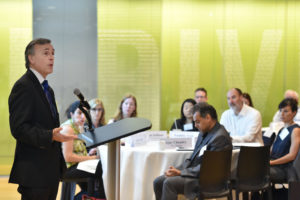Today, one in five American adults experiences a mental health issue, and one in 10 young people experiences a period of major depression.
The number of people struggling with conditions such as anxiety, depression, post-traumatic stress disorder, and substance abuse disorders (collectively called behavioral health conditions) is staggering, and health care systems are seeking better ways to provide care for those of us affected.
Exacerbating the problem is the fact that some populations, such as women and children with low incomes, face unique barriers to accessing behavioral health services. Factors such as poor educational attainment, inadequate housing, barriers to workforce participation, and poor health status can create structural hurdles that prevent individuals from taking the first step to accessing critical services.
These are just some of the daunting challenges that a group of more than 30 experts from various sectors – including leaders from the fields of health and human services, higher education, think tanks, and philanthropic organizations – gathered to discuss at the Center for Total Health on Friday, September 22.
Behavioral Health Leaders Come Together to Find Solutions
 The Georgetown Center on Poverty and Inequality and Mental Health America, with support from Kaiser Permanente, are leading an effort to identify creative ways to engage and coordinate community assets to transform the delivery of behavioral health supports, with a focus on treating the “whole person,” inclusive of the many factors that impact prevention and access to care. This day-long meeting marked the first in a series of four that will explore innovative ways to address these challenges facing the lowest income families and individuals.
The Georgetown Center on Poverty and Inequality and Mental Health America, with support from Kaiser Permanente, are leading an effort to identify creative ways to engage and coordinate community assets to transform the delivery of behavioral health supports, with a focus on treating the “whole person,” inclusive of the many factors that impact prevention and access to care. This day-long meeting marked the first in a series of four that will explore innovative ways to address these challenges facing the lowest income families and individuals.
As someone who suffers from depression and anxiety, I was encouraged to see leaders come together to learn from one another and identify opportunities for cross-sector collaboration. Notable speakers such as Don Mordecai, National Leader for Mental Health and Wellness for Kaiser Permanente and Director of Mental Health and Chemical Dependency Services for The Permanente Medical Group; Peter Edelman, Faculty Director of the Georgetown Center on Poverty and Inequality; and Patrick Courneya, Executive Vice President and Chief Medical Officer for National Health Plan and Hospitals Quality of Kaiser Permanente were among those who shared their unique insights and encouraged thoughtful discussion with attendees.
Throughout the day, participants created a vision for the future of whole-family care, discussed capacities needed at the community level to realize that vision, and brainstormed solutions to identified barriers, including changes at the policy level. A central theme was the need for multi-sectoral collaboration inclusive of finance, accountabilities, and outcomes.
An Important Step Forward, with Miles to Go
While I left the meeting with the reassurance that, by coming together and facilitating this important conversation, we’ve taken a big step in the right direction, I know there’s lots more work to do. Over the next two years we’ll continue to build upon the groundwork we laid today. We’ll constantly refine our strategies, informed by the real-world experiences and the knowledge we’re sharing with one another.
Ultimately, the findings gleaned from these meetings will result in a public report that summarizes our collective thinking on how best to address the daunting behavioral health challenges facing families with low incomes. The conversations I heard and participated in today make me hopeful that we will rise to the challenge and increase access to whole family behavioral health services for current and future generations.
This blog first appeared on the Center for Total Health blog.
The Kaiser Permanente Center for Total Health hosts internal and external educational events. All events – including annual banquets, quarterly meetings, trainings, interviews – can be customized to incorporate the interactive exhibits that make the Center for Total health experience both fun and informative for attendees. If your organization is interested in hosting an event, please send them an event request via the website.

